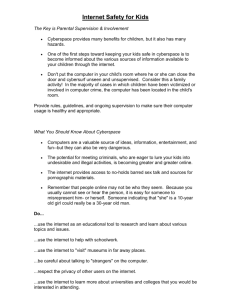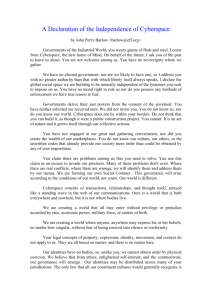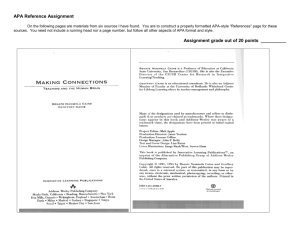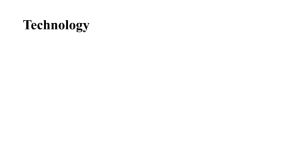here
advertisement
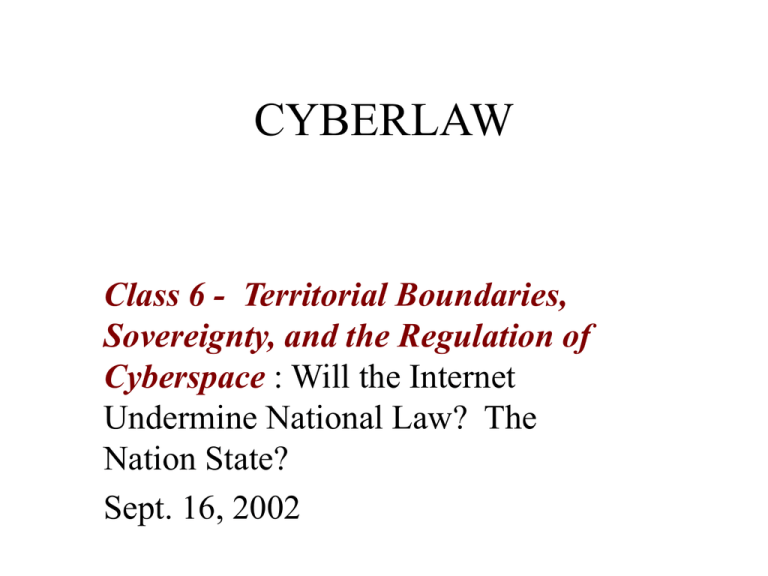
CYBERLAW Class 6 - Territorial Boundaries, Sovereignty, and the Regulation of Cyberspace : Will the Internet Undermine National Law? The Nation State? Sept. 16, 2002 David Post • Senior Fellow at Tech Center, George Mason • Associate Prof., Temple University Law School • Previously worked as an a anthropologist studying the feeding behavior of yellow baboons in Kenya's Amboseli National Park and teaching in the • Law clerk to Justice Ruth Bader Ginsburg David Johnson • Former partner at Wilmer, Cutler & Pickering • Now Chair of Counsel Connect, an electronic mail and conferencing system that connects corporate counsel and outside law firms, and has been instrumental in encouraging the use of IT in the legal profession • Co-founder of Virtual Workroom Jack Goldsmith • Professor of Law, The University of Chicago Law School • Clerked for Justice Kennedy on the U.S. Supreme Court James Boyle • William Neal Reynolds Professor of Law at Duke Law School. He joined the faculty in July 2000. He has also taught at American University, Yale, Harvard. Territorial Boundaries and Law • Ignoring cyberspace, to what extent is our legal system both domestic and international, based on territoriality? • Is “all law prima facie territorial”? Why or why not? Are Physical Borders Relevant for a digital world? • Are physical borders and physical geography irrelevant for the regulation of cyberspace? Why or why not? What do David Johnson & David Post think about this issue and about the ability of territorially-based laws to regulate cyberspace? What about Jack Goldsmith? • What do you think? Post & Johnson on Net Geography • “…events on the Net occur everywhere but nowhere in particular.” Post & Johnson Argue • “Cyberspace radically undermines the relationship between legally significant (online) phenomena and physical location. The rise of the global computer network is destroying the link between geographical location and: (1) the power of local governments to assert control over online behavior; (2) the effects of online behavior on individuals or things; (3) the legitimacy of the efforts of a local sovereign to enforce rules applicable to global phenomena; and (4) the ability of physical location to give notice of which sets of rules apply.” Johnson && Post – futility of efforts to control bits • “But efforts to control the flow of electronic information across physical borders--to map local regulation and physical boundaries onto Cyberspace--are likely to prove futile, at least in countries that hope to participate in global commerce. Individual electrons can easily, and without any realistic prospect of detection, "enter" any sovereign's territory. The volume of electronic communications crossing territorial boundaries is just too great in relation to the resources available to government authorities to permit meaningful control.” Johnson & Post • Options: • 1. Filtering/blocking • 2. Apply local law to any web site accessed by local residents • Argues that neither is viable and “no physical jurisdiction has a more compelling claim than any other to subject events [on the Net] exclusively to its laws.” Problems Raised By Johnson & Post • The trademark problem • The licensing problem (e.g. bank regulations, medical licensing, etc..) Assuming you agree with Post and Johnson, what is the solution? Assuming you agree with Post and Johnson, what is the solution? • “Many of the jurisdictional and substantive quandaries raised by border-crossing electronic communications could be resolved by one simple principle: conceiving of Cyberspace as a distinct “place” for the purposes of legal analysis by recognizing a legally significant border between Cyberspace and the “real world”.” Assuming you agree with Post and Johnson, what is the solution? • In other words: treat cyberspace as “a separate space to which distinct laws apply.” • They believe a net-based global registration system for domain names would solve the trademark problem. Would it? What about defamation, regulation of professional activities, fraud & antitrust, copyright law? If a new legal regime should apply to cyberspace… • Who should set the rules? • Would these rules be enforceable? • What do Post & Johnson think? Lex mercatoria? • What is this? • Is something similar in fact developing? Cyberspace: diverse territories • Johnson & Post argue that “the new sphere online is cut off, at least to some extent, from rulemaking institutions in the material world and requires the creation of a distinct law applicable just to the online sphere.” • But they also argue that “Cyberspace is not, beyond that border, a homogenous or uniform territory.” • What effect does this have on regulation? Goldsmith • Goldsmith totally disagrees with Johnson & Post that the Internet “undermin[es] the feasibility- and legitimacy – of laws based on geographical boundaries.” • Goldsmith: “from the perspective of jurisdiction and choice of law, territorial regulation of the Internet is no less feasible and no less legitimate than territorial regulation of non-Internet transactions.” Boyle • What does Boyle think of Johnson & Post’s “digital libertarianism”? • Why? Boyle • What is the “Internet Trinity”: 3 ideas of digital libertarians that Boyle challenges? Boyle • What is the “Internet Trinity”: 3 ideas of digital libertarians that Boyle challenges? • The Net interprets censorship and routes around it (John Gilmore) • In Cyberspace, the First Amendment is a local ordinance (John Perry Barlow) • Information Wants to be Free – (Stewart Brand) • Why does Boyle challenge these ideas? Boyle • Libertarians have an overly positivist view of the state (exercise of power by sovereign expressed by rules backed by sanctions) • In fact power is being exercised by many non-state sources of surveillance and control, often backed by technical enforcement means similar to Foucault’s Panopticon • Moreover, the state has more power than digital libertarians believe Territorial Sovereignty, according to Goldsmith • Nation’s prerogative to control events in territory entails power to regulate the local effects of extraterritorial acts. • Can regulate means of communication – hardware and software- located in territory, as well as Internet users in territory. Goldsmith Counters 3 Arguments • 1. Regulatory leakage is more serious for Internet than real world so Internet beyond territorial scope of one particular sovereign. • 2. Because Internet reaches many territorial jurisdictions simultaneously, it is simultaneously subject to all national regulation. • 3. One sovereign’s territorial regulation of Internet will lead to undesirable spillover effects How Unique is Cyberspace? • How different is it from the "real" world? Is cyberspace a place?
